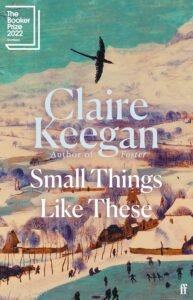
We are well and truly into the 2025 Booker Prize season. What better way to recognise the literary quality that this prize highlights than to mention Small Things like These by the masterful short story writer, Claire Keegan. Published in 2021, Small Things like These won the 2022 Orwell Prize, as well as being shortlisted for the 2022 Booker. This work is one of Keegan’s longer stories but still comes in at a svelte 110 pages. As with all of Keegan’s writing, precise language and expert pacing show what powerful messages and scenes can be rendered with concision; no word is out of place, less is certainly more.
Small Things like These is a story of rural Ireland in the 80s, telling a tale of a town held at the mercy of a convent and the Magdalene laundries they operate. This novella is told through the perspective of coal and lumber merchant Bill Furlong. Bill’s mother became pregnant out of wedlock and, being ostracised by her family, is luckily taken in by her employer, Mrs Wilson. This startpoint serves as an anchor for Bill’s life, pulling him back to the kindness of others, but also creating a contrast with those less fortunate – those that have ended up in the laundries.
We then follow Bill around the Christmas season while he balances work, sorting out presents and making time for family, whilst slowly unravelling the truth of these institutions. It seems to come as a revelation to Bill that the convent operates in this way: the poor treatment of the women and girls that are taken in, as well as a far-reaching control that is insidiously spread throughout the town.
Bill’s journey of discovery balances his past (his own upbringing – the kindness of strangers in adversity), alongside his present (accounting for the needs of his children – a protection of the status quo). As Keegan so eloquently puts it:
‘People could be good, Furlong reminded himself, as he drove back to town; it was a matter of learning how to manage the give-and-take in a way that lets you get on with others as well as your own.’
But such is Bill’s character, forged through his youth, that he ultimately makes severe yet heroic choices:
‘…his self-preservation and courage battling against each other.’
The way Keegan builds tension towards Bill’s final choice is so delicate and masterful. This seems to be a motif in Kegan’s work; to slowly draw the reader in before ending with a subtle but powerful reveal. This is true of both Foster and So Late in the Day.
Specifically, in this novella, Keegan asks whether we should all do more to challenge the treatment of those in desperate circumstances. Can you really be a religious practitioner and tolerate the callousness meted out by the very same people who orchestrate worship and community? Aren’t these actions mutually exclusive? Noble Bill is the exception and symbolises all that is virtuous and kind. He applies thought to a situation he knows to be wrong and is not held passive by the comfortable present state of affairs.
Going further still, whilst Small Things like These is describing the Magdalene laundries in Ireland, the overall premise of the book is universal and could be applied to any number of situations, past or present. Specifically, the reader is brought to the question of complicity: if you know a practice that is happening is wrong, should you take up action against it, even if this would put you or your family at a disadvantage? This is reminiscent of a quote from Martin Luther King Jr written in his letter from Birmingham Jail, ‘Injustice anywhere is a threat to justice everywhere’. Often we had felt that this sort of internal questioning is academic and confined to history, but this is simply no longer true. We should ask this question to ourselves right now with our eyes to the Middle East and Eastern Europe as well as on the environment as a whole. As with Bill Furlong’s ruminations, how much is enough to do the right thing and what is the cost? The counterargument, feeble though it may sound in a book, is all too commonly played out in reality and is put to Bill by his wife, Eileen:
‘And in any case, what do such things have to do with us?…’
‘Where does thinking get us? She said
‘All thinking does is bring you down’.
I think we can all recognise the pull to non-thinking and of ignoring the call for aid. Is there scope to behave more like Bill for all of us?
Small Things like These is a wonderfully powerful novella. Claire Keegan is certainly up there with the best masters of the short story form and I would recommend this title as an entry point to her work.
D